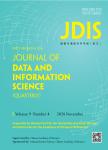Dynamics and interactions of blog-based science communication:A case study of blogging activities in China related to 2011 Japanese seismic and nuclear power crisis
Dynamics and interactions of blog-based science communication:A case study of blogging activities in China related to 2011Japanese seismic and nuclear power crisis作者机构:Tongji University Library Institute of ScienceTechnology and SocietySchool of Social SciencesTsinghuaUniversity Faculty of Engineering TechnologyKHBO (Association KU Leuven) Information and Library Science Universiteit Antwerpen School of Economics and ManagementTongji University
出 版 物:《Chinese Journal of Library and Information Science》 (中国文献情报(英文版))
年 卷 期:2013年第6卷第1期
页 面:33-51页
学科分类:08[工学] 080402[工学-测试计量技术及仪器] 0804[工学-仪器科学与技术]
基 金:supported by the National Natural Science Foundation of China(Grant No.:71173154) the National Social Science Foundation of China(Grant No.:08BZX076) the Social Science Foundation of Tongji University(Grant No.:3850219007)
主 题:Chinese blogosphere Informetrics Temporal characteristics Knowledge diffusion Assortativity
摘 要:Purpose: This paper tries to understand the dynamics of scientific communication systems during crises by investigating as a case study the blogging activities that took place during the period of the 2011 earthquake and related events in Japan. Interactions between bloggers and registered users are studied quantitatively and qualitatively at ***, an influential science-related blogosphere in ***/methodology/approach: The editors of *** compiled a special issue of science blog articles under the title Analysis of the Japanese Earthquake. We developed a spider program and downloaded from this special issue the metadata about title, content,publishing time, total read count, reply count and recommendation count, and further collected information about bloggers and recommenders. We then sent a short message to the bloggers who wrote articles on these emergencies, asking for their educational and professional ***: We found that knowledge reflected in the blog articles is strongly related to the educational and professional background of bloggers. Knowledge diffusion is facilitated by interactions, such as recommendations, comments and answers. Interactions via comments and recommendations are of an assortative nature: A blog article is more likelyto be commented on and recommended by those bloggers who write on the same or similar topics than by those writing on a different one. Registered users tend to give comments on articles dealing with the topic that they recommend, and vice *** in the intersection of two or three topics is more intense than that within one topic. The impact of blog articles is also influenced by other factors, such as the reputation of the blogger and the type of information they *** and limitations: It is confirmed that studying blogs is a valid approach within informetric studies. Yet, we only studied one triple(earthquake, tsunami, nuclear disaster) event based on data




